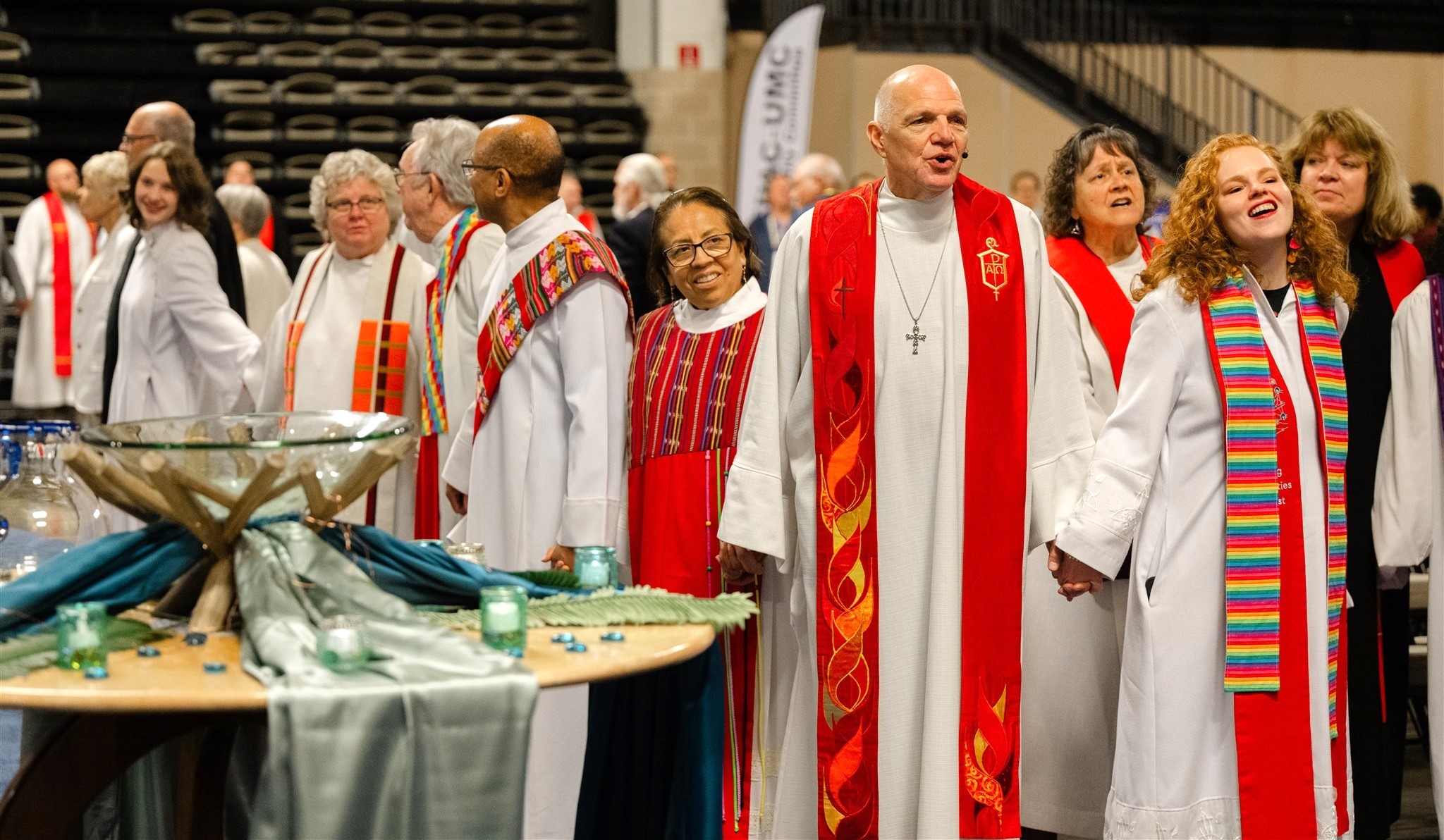 Bishop John Schol (center) holds hands with other Eastern PA Conference clergy during the closing hymn of the Service of Commissioning and Ordination. ©2024 Shari DeAngelo
Bishop John Schol (center) holds hands with other Eastern PA Conference clergy during the closing hymn of the Service of Commissioning and Ordination. ©2024 Shari DeAngelo
Eastern PA 2024 Annual Conference Summary
View the 2024 EPA Annual Conference Wrap-Up video. Relive the highlights, the powerful moments, and the inspiring messages. Click above to watch the full video and download it to share with your church this Sunday. TO DOWNLOAD IT GO HERE: https://vimeo.com/949575118?share=copy…
Watch the full livestream recording of the May 21 Laity Session and the May 21-23 Annual Conference at https://www.epaumc.org/ac2024/.
Watch and download other videos played at the Annual Conference: https://youtube.com/playlist…
Click here to access the full gallery of photos from the Commissioning and Ordination Service that you can also share in your church presentation. The photos will be updated until the end of the week.
By John W. Coleman
The Eastern Pennsylvania Annual Conference, meeting May 21-23 in Wildwood, NJ., made history twice with two actions—one offering a redemptive healing of its past; the other offering a resilient hope for its future.
The conference began with an historic and inspiring procession of robed clergy into the annual Service of Commissioning and Ordination—historic because it included the Rev. Irene Elizabeth “Beth” Stroud. Defrocked 20 years ago for her admission to being in a committed relationship with another woman, she was reinstated and warmly welcomed back at a clergy session just before the service. That action allowed her to rejoin her peers in the procession, wearing a borrowed clergy stole.
Stroud’s reinstatement—by a more than two-thirds vote of the Eastern PA clergy session—was made possible by a May 3 decision of The United Methodist Church’s (postponed) 2020/2024 General Conference to allow for the reinstatement of clergy who were previously defrocked due to their sexual identity. She may be the denomination’s first reinstated clergy member to benefit from that decision. (Read Eastern PA Annual Conference celebrates Beth Stroud’s reinstatement as an elder)
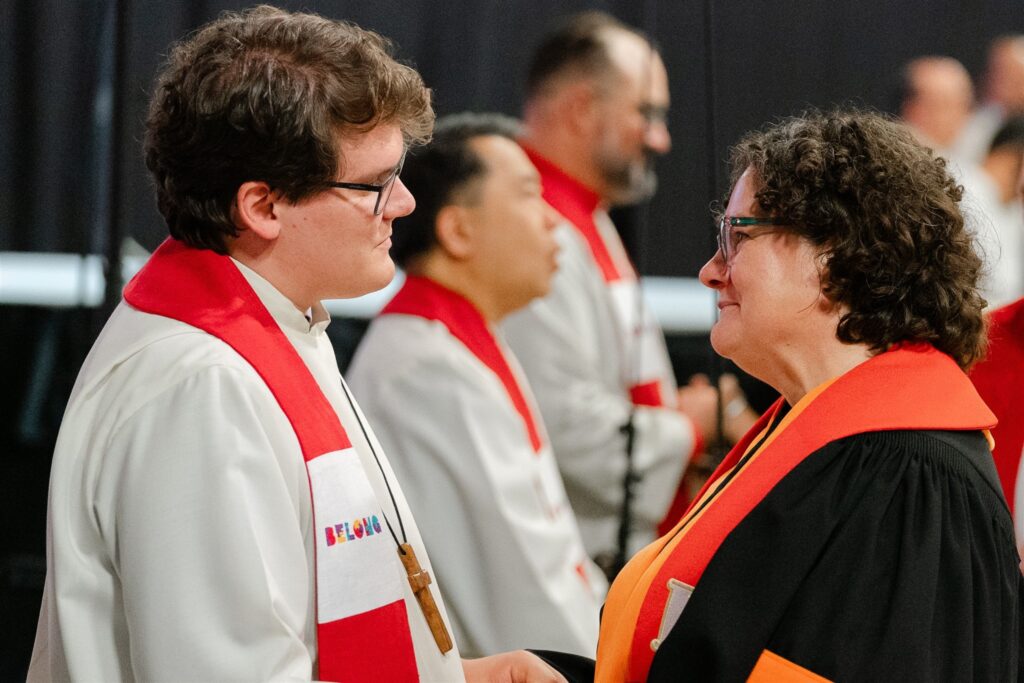
The evening service filled the convention hall with a triumphant spirit, uplifted by inspirational prayers, stirring music, colorful worship pageantry and joyous appreciation for those who endured years of preparation toward their ordination and commissioning. It ended with attendees singing conference musician Mark Miller’s embracing anthem “Draw the Circle Wide,” as most moved out from their seats to encircle the vast hall, holding hands and looking into one another’s faces as they sang.
Bishop John Schol ordained three clergy members as full elders: the Revs. Jeffrey D. Kapp, Mark Salvacion and Graham Truscott. He commissioned four provisional elders: the Revs. Heather Hammel, Jeong Gyun Hong, David Roy Piltz and Jared Kent Stoltzfus. And he commissioned the Rev. Brittany Jaine Whyte as a provisional deacon. (Read EPA Annual Conference to ordain, commission 8 clergy.)

The bishop preached from the conference theme, Belong, from Romans 12:5. He urged the church to reject society’s misguided demands that people first become and believe alike before they are allowed to belong. “You have to do what Jesus says: first invite and engage others to belong, then help them grow to believe, and then they can become the disciples God is calling them to be.”
Historic MOU agreement approved
The other historic action by this annual conference was its approval on May 22 of a Memorandum of Understanding (MOU) to formalize and extend the 18-month collaborative partnership between the Eastern PA (EPA) and Greater New Jersey (GNJ) conferences—a partnership often referred to as EPA&GNJ.
The MOU resolution was co-presented to both annual conferences by their two Connectional Table chairpersons—Lenora Thompson of EPA and the Rev. Iraida Ruiz De Porras of GNJ. Recognizing the hard work and resilient hopefulness invested in forging the proposal, EPA members voted to approve it by a margin of nearly 74 percent.
GNJ previously approved it on May 20 by a similar vote tally of about 75 percent. The two conferences met consecutively at the Wildwoods Convention Center—GNJ on May 19-21, and EPA on May 21-23.
The dual agreement formalizes the groundbreaking partnership that elected committees, leaders and staff of the two conferences have been working to develop for a year and a half. Now it will allow them to collaborate more in their decision-making, staffing, budgeting and ministry planning.
Both conferences’ presenters assured members that the legally non-binding MOU is an “iterative” plan that can be adjusted as needed and will be reviewed and updated by conference leaders and future conference sessions. There were questions and a motion to delay the plan until after the Northeastern Jurisdictional Conference in July considers possible new conference alignments and episcopal assignments, due to an expected reduction in the number of NEJ bishops.
But presenters—which included EPA’s Treasurer and Chief Financial Officer Jo Fielding—explained that the MOU allows for adaptation if there are new conference alignments and affiliations, and if EPA’s next bishop wishes to make any changes.
Bishop’s episcopal address
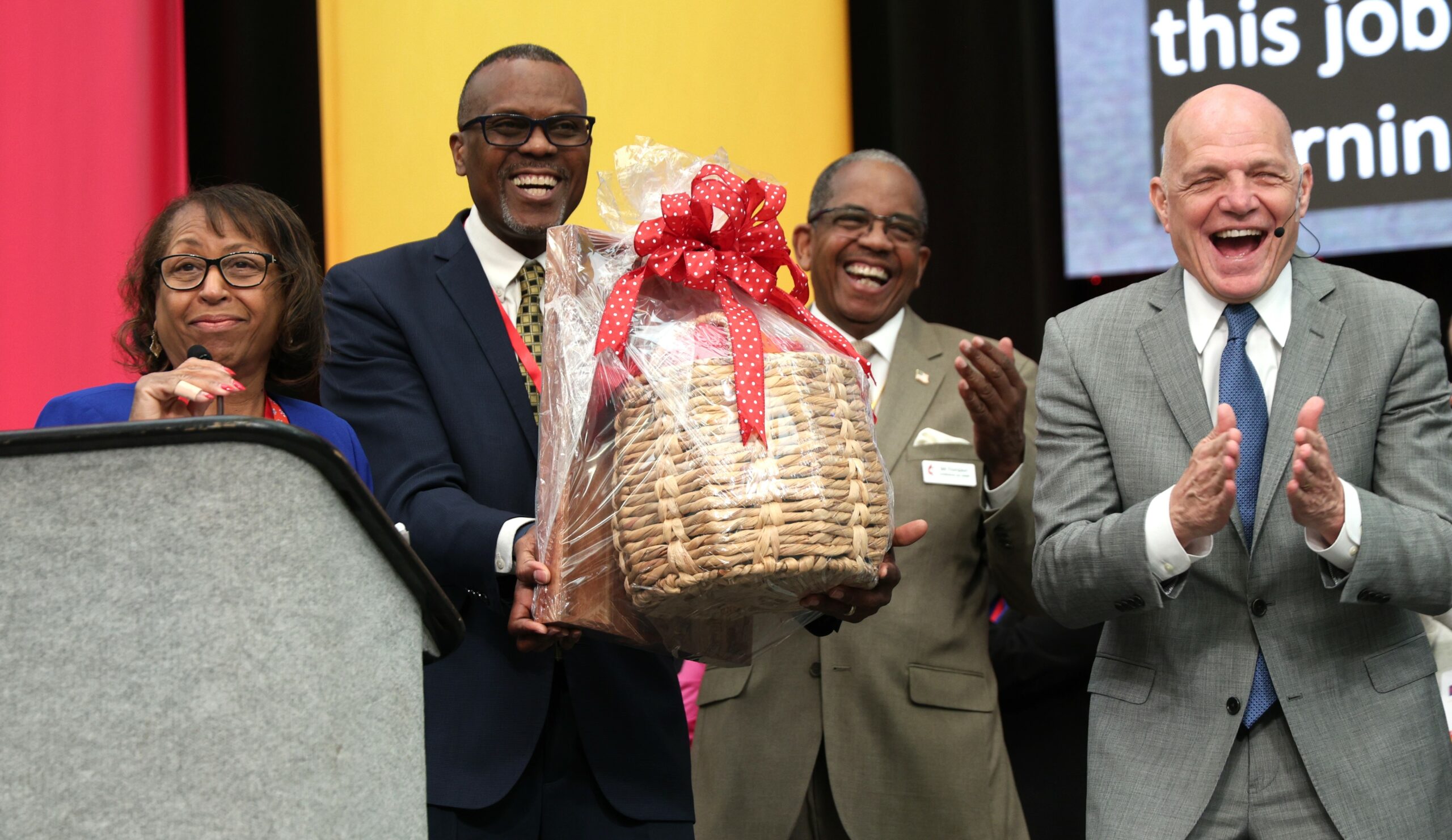
In his Episcopal Address, Bishop Schol praised EPA churches and leaders for “recruiting and developing transformational leaders, making new disciples of Jesus Christ and growing vital, missional congregations,” while aligning resources “toward a comprehensive strategic direction…(with) measurable results.”
He noted significant challenges during his nearly three-year tenure, including the COVID pandemic, disaffiliation of some churches, and fewer conference staff and dollars. But he credited EPA’s staff and elected leaders—especially the Cabinet, Board of Trustees and Council on Finance and Administration—for navigating those challenges.
The bishop recalled the 2022 discovery of deficiencies in conference budgeting and spending procedures, as well as billing and collections. He cited remedies the conference approved at a special session in September 2023 that included reorganized staffing, development of a comprehensive budget and implementation of internal controls, more accurate billings and fund management. Those changes now give the annual conference a closer review and monitoring of all annual EPA income and spending.
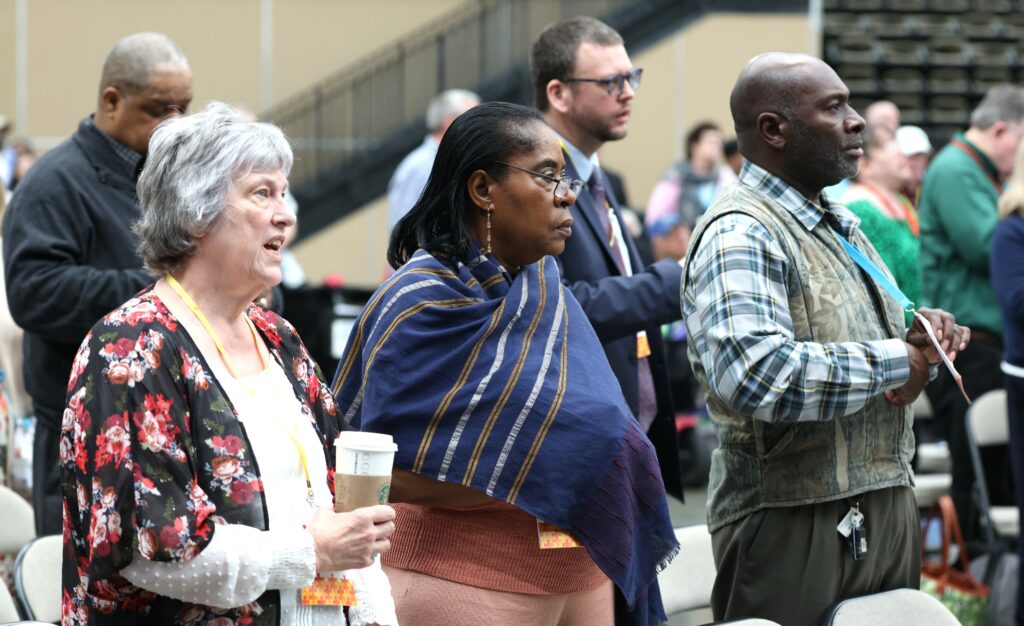
Schol expressed thanks for the questions and challenges that greeted fundamental changes. “These questions and challenges are essential when going through such changes, and they helped lead to a better than 90% approval of the policies and the 2024 budget,” he said. “Today, there are policies and reporting mechanisms in place that create greater transparency and sound financial practices.”
He also commended two decisions made by the recent General Conference: structural regionalization that allows for contextual rules and decision-making across the global church; and immediate removal from the Book of Discipline of language that for decades has condemned homosexuality and barred LGBTQ members from full participation in the life and ministry of the church. The latter decision has brought “joy, hope, fear, disappointment and anger,” he said.
Calling it “a privilege to serve with a people who first loved me and birthed me,” the bishop prescribed three “Rs” as key for the conference’s future health:
- Relationships that, despite differences, can foster “unity and collaboration toward a common strategic missional direction.”
- Results that indicate the bearing of much fruit: “The hungry are fed, new disciples are born again, damaged homes are rebuilt, Hope Centers are birthed, leaders are called and developed, diversity grows, and racism is ended.”
- Regeneration through “healthy policies, procedures and processes” that lead to measurable, meaningful goals and accountability. “Strengthening organizational life is important.”
The conference celebrated Schol’s retirement with his family on stage, offering him grateful praise and gifts.
EPA episcopal endorsements
The annual conference endorsed two Extended Cabinet members as candidates for election to the episcopacy in July. The Rev. Dawn Taylor-Storm, EPA’s Director of Connectional Ministries and EPA&GNJ Assistant to the Bishop for Leadership Development, was the first to receive sufficient votes for endorsement, followed by the Rev. Andrew Foster III, East District Superintendent, in a subsequent ballot. The conference declined the recommendation of its General and Jurisdictional Conferences delegation to not endorse any candidate.
Currently, there are six active bishops and one retired bishop, Peggy Johnson, serving the 10 annual conferences in NEJ—with three bishops serving more than one conference. Bishop Schol’s retirement would leave five active bishops.
The NEJ Conference is expected to assign six active bishops for the 2024-2028 quadrennium. That means it may need to elect a new bishop; or it may instead receive a bishop who agrees to transfer from another jurisdiction, a new possibility just approved by the General Conference. If the NEJ’s Episcopacy Committee, which meets in June, proposes receiving a transferred bishop, an election in July may not be necessary.
Innabah land easement and acknowledgment
The conference approved a negotiated easement for conservation of 126 acres of land at its Innabah Camp & Retreat Center in Spring City. A conservation easement is a voluntary, legal agreement that permanently limits development and usage of land to protect its conservation values. Innabah will retain ownership of the land and be paid from $1,392,000 to $1,834,000 by a conservation trust for the loss of its usage value.
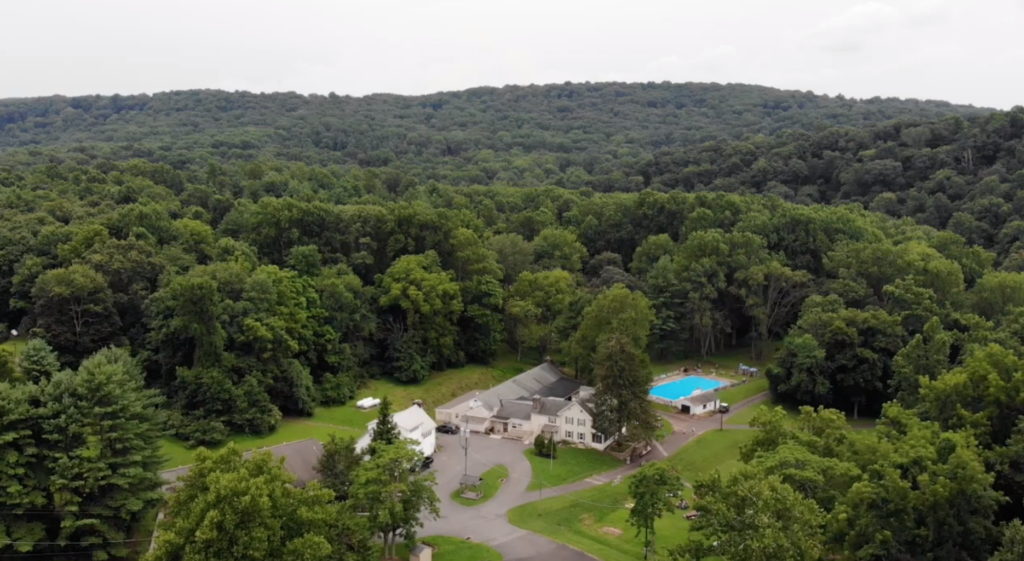
The payment would enable EPA’s Camp & Retreat Ministries board to pay all of Innabah’s past payroll liability and provide future funding for camp development, improvements and scholarships. The funds would be invested and monitored according to EPA’s new fund policy. Innabah can use the remaining 46 acres of its property without restrictions.
In approving the easement agreement, the conference also passed an amendment that calls for Innabah to visibly indicate acknowledgement that its land originally belonged to the Lenni-Lenape Native Americans. That tribe inhabited the northeastern United States, including parts of Pennsylvania, New Jersey, Delaware and New York. The proposal mandates education that surpasses the merely symbolic acknowledgment of original indigenous land ownership that is pronounced at the opening of each annual conference session.
EPA’s Committee on Native American Ministry (CoNAM) also won approval of a social advocacy resolution titled “Continuing the Journey toward Healing and Wholeness with Indigenous People.” It calls for EPA to join with the UMC’s Council of Bishops (COB) who took a “bold stand against voter suppression in 2020 and again in 2022 in their belief that ‘…the right of every citizen to vote in the United States is under attack…”
The COB urges United Methodists to “use their influence in their states, legislative districts, and local precincts to enable voter registration and to encourage elected officials to provide the resources necessary to support the fullest participation in elections.” (A Call for Equal Voting Rights, January 2022)
General, Jurisdictional Conferences
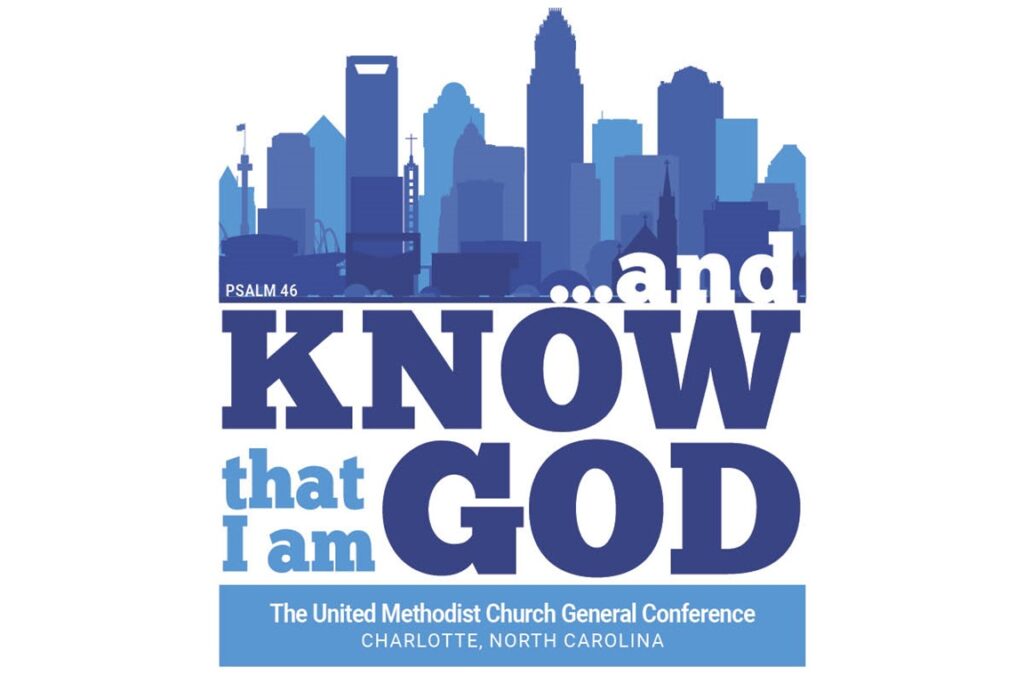
EPA’s delegation to the General Conference reported on their experiences and impressions of the (postponed) 2020/2024 General Conference, April 23-May 3, in Charlotte, N.C. They highlighted key legislation passed by the quadrennial assembly, including:
- Regionalization of the global denomination’s structure.
- Removal of discriminatory language and restrictions related to ministry by, with and for “self-avowed practicing” gay and lesbian people.
- A decrease in the apportionment percentage assigned to churches for support of connectional ministry.
- A 2025-2028 budget of $373.4 million, about 40 percent less than the current budget passed in 2016.
- The first full revision of the denomination’s Social Principles in nearly 50 years.
- An end to the temporary church disaffiliation policy passed by the special 2019 General Conference and a mandate that annual conferences develop “grace-filled policies for reaffiliation of churches that want to rejoin the denomination.”
- Extension of sacramental authority to ordained deacons, allowing them to celebrate baptism and communion where appropriate.
- Approval of a new retirement plan for U.S. clergy, called Compass, that includes a defined contribution plan similar to what many corporate employers provide. The plan takes effect in 2026.
- Approval of a full communion agreement with the Episcopal Church, pending the Episcopal Church’s approval when its legislative assembly meets in June.
- Approval of two constitutional amendments that address our commitment to eradicating racism and that include “gender” and “ability” among the attributes that should not impede full participation in the life of any congregation.
- Approval of an apology to victims and survivors of sexual misconduct by clergy and lay leaders in the church. The resolution also encourages the reporting of sexual abuse and states that the abuse of power will not be tolerated in the church.
Bishops were asked to read the apology for sexual misconduct aloud to their annual conferences, which Bishop Schol did during the session.
In addition, the conference elected five new reserve delegates to represent EPA at the Northeastern Jurisdictional Conference July 8-12 in Pittsburgh, since some delegates elected in 2019 are unavailable to serve. Only the first clergy and laity reserves will serve onsite as alternate delegates; but the remaining reserves are needed should vacancies arise.
Elected as reserve lay delegates are: Deaconess Darlene DiDomineck, Cynthia Forry and Barbara Revere. Elected as reserve clergy delegates are: the Revs. Alicia Julia-Stanley and Lloyd Speer.
Honoring clergy transitions
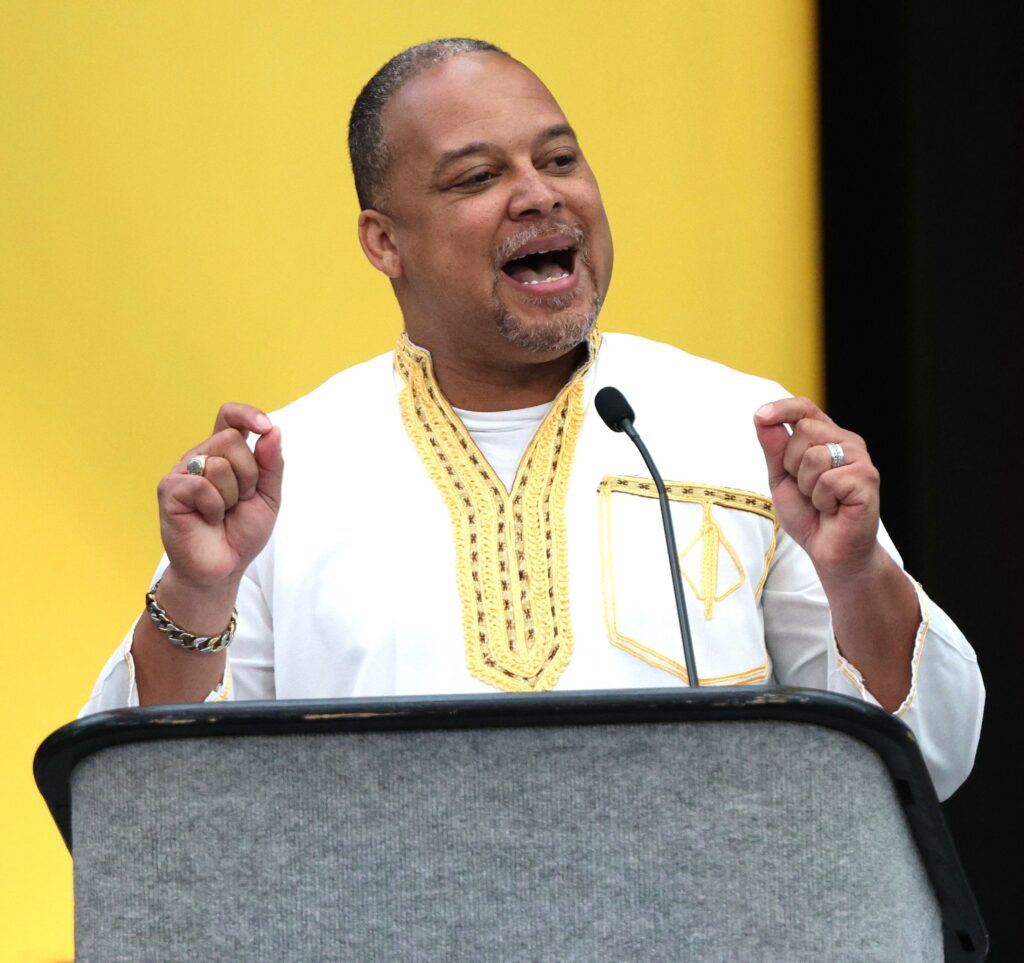
Steward Warner photo
The Rev. William Brawner, pastor of Mother African Zoar United Methodist Church in Philadelphia, preached a rousing sermon for the Memorial Service to remember clergy and clergy spouses who passed since the last Annual Conference through April 2024.
The Rev. Elizabeth Flory, retiring as a deacon after serving the Church of the Good Shepherd in Lebanon for 13 years, offered a brief charge to newly ordained and commissioned clergy during the annual Service of Passing and Anointing. Flory, one of 22 new clergy retirees, joined others in embracing their new peers with symbolic stoles.
Other Conference actions
The Annual Conference approved a full slate of leaders and members of conference boards, committees and agencies for 2024-2028, as nominated by the Committee on Nominations and Leadership. The assembly also celebrated new ordained and commissioned clergy, new licensed local pastors, new Certified Lay Ministers and 2024 recipients of the Harry Denman and One Matters awards for evangelism (Read EPA Recognizes Four Who ‘Go and Make Disciples’), and the Herbert E. Palmer Urban Ministry Award (Read Urban Ministry Awards Go to 4 Community-Engaged Churches),
Members approved eight ministry projects as Conference Advance Specials, giving them exclusive rights to solicit funding support conferencewide from churches that first fulfill their shared (connectional) giving and billing remittances.
The 2024-25 Advance Special ministries are:
- The Center-Philadelphia and Grace Café at Arch Street UMC.
- Code Blue winter homeless shelter ministry at Haws Avenue UMC, Norristown.
- The Summer Reading and Lunch Program at Cokesbury UMC, Marcus Hook.
- The Liberia Education Project at Somerton UMC, Philadelphia.
- Light of Marnie, which supports a Christian Academy in Liberia, West Africa.
- LUMINA, a family and community services ministry in Lancaster.
- Spiritual Renewal Ministries, Inc., providing spiritual direction, retreats and seminars.
- Wesley Foundation of Philadelphia, a UM-related campus ministry at Drexel University.
Moreover, the conference passed a 2025 budget and approved annual proposed adjustments in clergy benefits for 2025, related to:
- Clergy Retirement Security Program (CRSP)
- Rental/Housing Allowances for Retired or Disabled Clergypersons
- Equitable Compensation for clergy in churches facing economic difficulties
- A Clergy Salary Arrearage Policy
And members voted to discontinue eight closed churches:
- Fremont: Union UMC
- Pottstown: Salem UMC
- Hamburg: Bethany UMC
- Port Carbon: First UMC
- Donaldson UMC
- Philadelphia: Servants of Christ UMC
- New Providence: Clearfield UMC
- Philadelphia: Trinity UMC
New pastoral appointments include new church start
The plenary body enjoyed another procession when the four EPA district superintendents read a list of new pastoral appointments. The incoming pastors and their future lay members to conference marched forward to festive music and cheers and then joined Bishop Schol for group photographs.
One new pastoral appointment announced is a new church start in Philadelphia that will begin organizing this summer, paired with a new Philadelphia United Methodist Center for Urban Ministry. The Rev. Myra Maxwell, who served the just-closed Trinity UMC, will lead the new congregation and urban ministry center, with support from EPA’s Cabinet, Urban Commission and Congregational Development Team, among other groups.
Finally, the Rev. Jacqueline Tilford, Conference Secretary, introduced her successor in that role beginning July 1: the Rev. Joong Hyuck Kim, the pastor of Korean UMC in Hellertown and Fritz Memorial UMC in Bethlehem.
